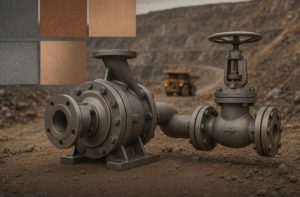The Best Alloys for Pump and Valve Components in Mining Applications
Mining is one of the most demanding industries in the world — not just for people and machinery, but for materials.
Nowhere is this more evident than in pumps and valves. These components are the unsung workhorses of mining operations, and they often take the brunt of harsh environments: acidic slurries, high-velocity flow, abrasive particles, thermal stress, and corrosive water chemistry.
When these components fail — and they will if the wrong materials are used — the consequences are serious: downtime, lost production, emergency repairs, and recurring maintenance that can cripple even the most efficient operation.
At PM International, we work closely with mining clients across North and South America to supply high-performance alloys that help their pumps and valves last longer, operate more reliably, and reduce costly shutdowns.
Here’s what your team needs to know.
Why Pumps and Valves Fail So Often in Mining
From ore slurry transfer to chemical leaching systems, mining processes are incredibly hard on equipment — especially on pumps, valves, and piping.
Some of the most common failure modes we see include:
Erosion
Caused by suspended solids (sand, ore, tailings) that wear down valve seats, impellers, and housings — particularly at elbows, throttling valves, or high-pressure drops.
Cavitation
A killer in pump impellers and valve trim, cavitation leads to pitting, vibration, and eventual metal fatigue due to vapor bubbles collapsing under pressure.
Corrosion
In acidic environments (e.g., sulfuric acid leaching), standard stainless steels like 316L can suffer from pitting, crevice corrosion, and accelerated material loss.
Thermal Fatigue or Pressure Cycling
Remote mines often run equipment hot and hard — and quick cycling from stop-start operations leads to stress cracking and seal failures.
When a valve or pump fails in a remote location, replacement isn’t always fast or easy — which makes proper alloy selection essential to the bottom line.
What to Look for in Pump and Valve Alloys
Material choice isn’t just about corrosion resistance — it’s about performance under multiple simultaneous stressors. The right alloy should offer:
– High resistance to erosion and particle abrasion
– Resistance to chlorides, acids, and caustic solutions
– Mechanical strength at operating temperatures and pressures
– Long-term reliability under cycling conditions
– Availability for repair and replacement cycles
– Weldability or machinability (especially for custom solutions)
Top Alloy Choices for Mining Applications
Here’s how some of the most effective alloys stack up:
| Alloy | Strengths | Common Applications |
| C95800 Aluminum Bronze | Excellent strength and erosion resistance; resists cavitation and fouling; performs well in seawater and slurry | Pump impellers, valve bodies, bushings |
| 70/30 Copper Nickel | High resistance to chlorides and erosion-corrosion; performs in high-flow, corrosive fluids | Valve trim, high-velocity lines, pump internals |
| Titanium Grade 12 | Outstanding corrosion resistance; performs in hot acid, chlorides, and pressure systems | Acid leach circuits, chemical injection systems |
| Duplex Stainless (2205) | Higher strength than 316L, better chloride resistance, cost-effective vs. nickel alloys | Pump housings, pipe spools, non-sour services |
Why 316L Stainless Often Falls Short
316L stainless is a popular, widely available material. But in mining applications, especially those involving slurries or acids, it often just isn’t enough.
Problems include:
– Pitting and crevice corrosion in acidic or chloride-rich environments
– Fast erosion under slurry or turbulent flow
– Cracking or galling in threaded or high-pressure assemblies
In our experience, many mining teams choose 316L by default, only to replace it repeatedly — making “cheaper” components much more expensive over time.
Real-World Example: Solving Impeller Failure in a Gold Mine
One gold mine in South America was experiencing impeller failure every 6–8 months in a key slurry pump line using 316L stainless. Each failure led to system shutdown, pump disassembly, and up to $75,000 in lost production and labor.
PM International helped them transition to C95800 aluminum bronze impellers and bushings — known for their erosion and cavitation resistance.
Results:
– 3× longer impeller life
– Reduced vibration and maintenance issues
– $100,000+ saved in just over a year
Why Engineers Choose PM International
We specialize in supplying industrial-grade alloys built for corrosive, abrasive, and high-performance environments. When it comes to pumps and valves in mining, we offer:
– In-stock C95800, 70/30 CuNi, and Titanium Grade 12
– Forged and machined valve bodies, impellers, flanges, and bushings
– ASTM, NORSOK, and EN compliant materials with full MTR traceability
– Support from engineers who understand how mining systems fail — and how to stop it
We also offer short lead times, global shipping, and the ability to help you standardize components across multiple mine sites.
Final Thoughts: Don’t Let Material Choices Drain Your Budget
Your valves and pumps don’t fail because they’re used — they fail because they’re not using the right materials.
When the environment involves slurry, pressure, or corrosive fluids, choosing alloys like C95800 aluminum bronze, 70/30 copper nickel, or Grade 12 titanium can prevent breakdowns and eliminate repeated costs.
Whether you’re designing a new circuit or dealing with constant maintenance headaches, we’re here to help you choose the right alloy — and deliver it on time.
Request a Quote or speak with PM International today about sourcing pump and valve components built to last in mining environments.





